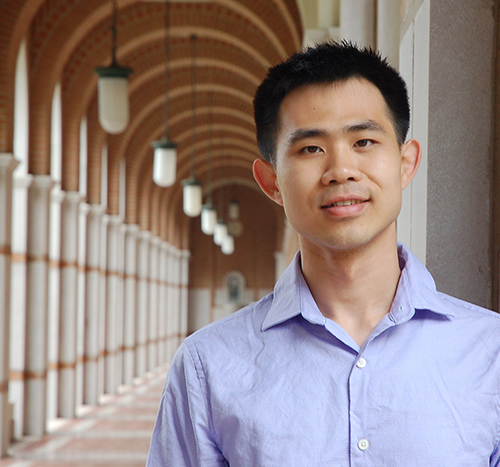 Shangyu Luo, a 5th year Computer Science Ph.D. student, recently won a best paper award at a prestigious conference, but he isn’t resting on his laurels. His immediate goal is to continue developing his expertise in the area of machine learning applications for systems.
Shangyu Luo, a 5th year Computer Science Ph.D. student, recently won a best paper award at a prestigious conference, but he isn’t resting on his laurels. His immediate goal is to continue developing his expertise in the area of machine learning applications for systems.
In his first year at Rice, Luo met potential faculty advisers to decide whom he would work with in his Ph.D. period. He said, “I reached out to Chris, and he was a very genuine person. He introduced his on-going work to me.
“The first small project he gave to me was a way for me to start finding out how research works in his team. The project helped me get to know the Markov chain Monte Carlo (MCMC) algorithm, and understand how it works. That was helpful to comprehend the mathematical fundamentals behind the machine learning applications.”
Later, Jermaine asked Luo if he was interested in learning about some systems, and now Luo’s primary work involves applying machine learning on top of distributed systems.
He said machine learning is already being applied to a variety of systems in industries around the world, from searching for something online to producing a product. “The self-driving car is a good use of machine learning. Consider how the car knows the world around it. What is a tree, a car, or a person to a self-driving vehicle?
“We use machine learning to identify objects around it. What is the line on the road that you avoid so you don’t crash? How do you analyze the signs on the road, when you need to slow down, or find the most efficient way of driving? A lot of decision-making for the vehicle is based on machine learning.”
Jermaine’s research team also utilized machine learning techniques. Instead of applying them on the self-driving car, the team integrated machine learning to database systems. Their recent published work won the Best Paper award at the 2017 IEEE International Conference on Data Engineering (ICDE17). Luo co-authored the paper with Jermaine, Zekai “Jacob” Gao, and two other CS researchers. They presented a new approach to the scalable linear algebra problem. The typical solution to the problem of large-scale linear algebra computation is to build new systems from the ground up to support such calculations, but in “Scalable Linear Algebra on a Relational Database System,” the authors made a few changes to existing relational technology to achieve similar or better performance when compared to results of the state-of-the-art special-purpose systems.
Luo said presenting the ICDE17 paper was a major milestone in his Ph.D. experience. “The ICDE is one of the top conferences for databases and the acceptance rate is only about 18%, so getting in was an achievement.
“That moment we got to go on the stage and receive the Best Paper award was amazing. Many people wait for a moment like that, and it was very exciting! I practiced a lot for my presentation, and I really enjoyed the opportunity to tell people what our work was about. The more I realized other scientists valued our work, the more I felt driven to reengage with the research on a new level.”
 Based on his own experience, he recommends other Ph.D. students spend time learning communication skills and how to talk about their work. “You need a succinct and precise way of introducing your work and your area of research. You should also be able to talk about your work in a wider range of areas and contexts, and look at it in a higher level.
Based on his own experience, he recommends other Ph.D. students spend time learning communication skills and how to talk about their work. “You need a succinct and precise way of introducing your work and your area of research. You should also be able to talk about your work in a wider range of areas and contexts, and look at it in a higher level.
He also said the presentation itself requires specific communication skills. “You don’t just stand there and read your slides. Get the audience engaged. If you are passionate, people will enjoy the experience. Develop skills to deliver your work to both general audiences as well as to groups of professors with expertise in your area.”
In his opinion, the Ph.D. experience is the perfect opportunity for students to formalize their thinking. Regardless of whether their career path leads them to industry or academia, the Ph.D. students need to know how to define a problem as well as what other people have already done in that area.
“It isn’t just about the coding,” he said. “How do you think about your project? Formalize your ideas and then present them clearly. And always ask the question, ‘Why?’ Why does your adviser give you that project? Why this research is important? Why your work is valuable? What will you learn from your project?
“Difficult projects grow your mind, and successful students figure out ways to overcome the difficulties. Some may not find it easy to get the results they want, but they enjoy the process.”
Shangyu Luo’s adviser is Chris Jermaine; he completed his M.S. in 2016.